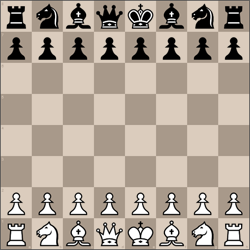January 12 1928
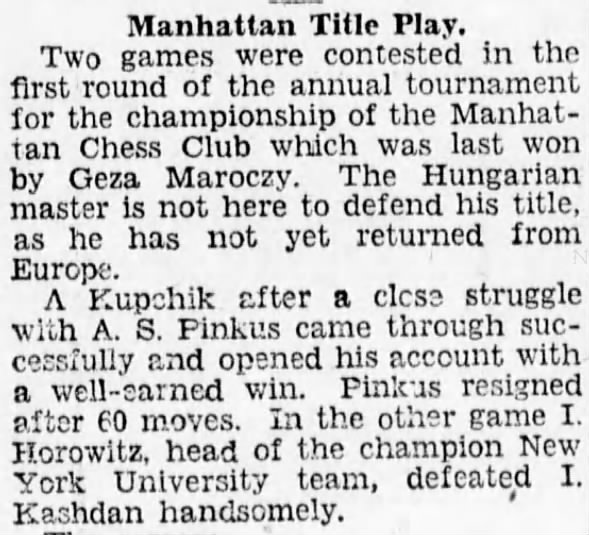 Manhattan Title Play 12 Jan 1928, Thu The Brooklyn Daily Eagle (Brooklyn, New York) Newspapers.com
Manhattan Title Play 12 Jan 1928, Thu The Brooklyn Daily Eagle (Brooklyn, New York) Newspapers.com
Manhattan Title Play.
Two games were contested in the first round of the annual tournament for the championship of the Manhattan Chess Club which was last won by Geza Maroczy. The Hungarian master is not here to defend his title, as he has not yet returned from Europe.
A. Kupchik after a class struggle with A. S. Pinkus came through successfully and opened his account with a well-earned win. Pinkus resigned after 60 moves. In the other game I. Horowitz, head of the champion New York University team, defeated I. Kashdan handsomely.
Isaac Kashdan vs Israel Albert Horowitz
Manhattan CC-ch (1928), New York, NY USA, Jan-??
Philidor Defense: General (C41) 0-1
January 26 1928

 Manhattan C. C. Championship. 26 Jan 1928, Thu The Brooklyn Daily Eagle (Brooklyn, New York) Newspapers.com
Manhattan C. C. Championship. 26 Jan 1928, Thu The Brooklyn Daily Eagle (Brooklyn, New York) Newspapers.com
Manhattan C. C. Championship.
A. S. Pinkus and I. Kashdan after losing in the opening round both won their games in the second round of the annuel championship tournament at the Manhattan Chess Club. Both scored with the black pieces. Pinkus defeated I. Horowitz in a Zukertort opening after 38 moves and Kashdan won from H. Steiner in an irregular opening after 49 moves. A. Kupchik, who won from Pinkus in the first round, had a bye. The scores: Kupchik 1-0; Horowitz, Kashdan and Pinkus, each 1-1; Steiner 0—1.
The pairings in the third round were Pinkus vs. Steiner and Kupchik vs. Horowitz, the latter of which was Steiner had a slight advantage over Pihkus when their game was adjourned.
February 02 1928
 Knight Vanquishes Bishop 02 Feb 1928, Thu The Brooklyn Daily Eagle (Brooklyn, New York) Newspapers.com
Knight Vanquishes Bishop 02 Feb 1928, Thu The Brooklyn Daily Eagle (Brooklyn, New York) Newspapers.com
Knight Vanquishes Bishop.
That a knight is superior to a bishop in certain types of endings is well known, but not always possible of demonstration. I. Kashdan, however, did so most effectively in his game with H. Steiner in the second round of the championship tournament at the Manhattan Chess Club. While two connected passed pawns on the queen's side of the board were held in check by the knight, stationed to advantage in the center, Kashdan forced through his own pawns on the king's wing, thereby scoring a victory in 49 moves.
Herman Steiner vs Isaac Kashdan
Manhattan CC-ch (1928), New York, NY USA, Jan-??
Bogo-Indian Defense: Nimzowitsch Variation (E11) 0-1
February 09 1928
 Steiner Thwarts Kupchik 09 Feb 1928, Thu The Brooklyn Daily Eagle (Brooklyn, New York) Newspapers.com
Steiner Thwarts Kupchik 09 Feb 1928, Thu The Brooklyn Daily Eagle (Brooklyn, New York) Newspapers.com
Steiner Thwarts Kupchik.
H. Steiner was the first to check the career of A. Kupchik in the championship tournament at the Manhattan Chess Club by drawing with him in 41 moves. Ingeniously sacrificing his queen, he was able, nevertheless, to bring about a perpetual check. I. Kashdan and A. S. Plnkus also played to a draw.
Isaac Kashdan vs Albert Pinkus
Manhattan CC-ch (1928), New York, NY USA, Feb-??
Queen's Gambit Declined: Orthodox Defense. Rubinstein Attack (D65) 1/2-1/2
February 16 1928
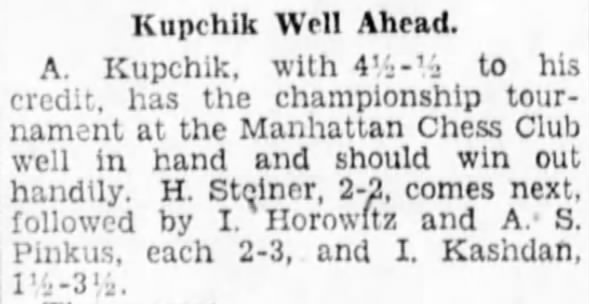 Kupchik Well Ahead 16 Feb 1928, Thu The Brooklyn Daily Eagle (Brooklyn, New York) Newspapers.com
Kupchik Well Ahead 16 Feb 1928, Thu The Brooklyn Daily Eagle (Brooklyn, New York) Newspapers.com
Kupchik Well Ahead.
A. Kupchik, with 4½-½ to his credit, has the championship tournament at the Manhattan Chess Club well in hand and should win out handily. H. Steiner, 2-2, comes next, followed by I. Horowitz and A. S. Pinkus, each 2-3, and I. Kashdan, 1½-3½.
Israel Albert Horowitz vs Isaac Kashdan
Manhattan CC-ch (1928), New York, NY USA, Feb-??
French Defense: Exchange Variation (C01) 1-0
April 12 1928
 Victors in League Match. 12 Apr 1928, Thu The Brooklyn Daily Eagle (Brooklyn, New York) Newspapers.com
Victors in League Match. 12 Apr 1928, Thu The Brooklyn Daily Eagle (Brooklyn, New York) Newspapers.com
Victors in League Match.
Dr. Harry Kline and I. Edelman alone were able to turn in wins for the I. L. Rice Progressive Chess Club in the Metropolitan League match which it lost to the Manhattans in the final round. Both had able opponents, and of necessity they played sterling chess.
Played between Dr. H. Kline, Rice-Progressive, C.C., and I. Kashdan, Manhattan C. C., in the Metropolitan League match, April 7, 1928.
Dr. Harry Kline (white) vs. Isaac Kashdan (black)
Alekhine Defense: Exchange Variation
 Special Prize to Pinkus 12 Apr 1928, Thu The Brooklyn Daily Eagle (Brooklyn, New York) Newspapers.com
Special Prize to Pinkus 12 Apr 1928, Thu The Brooklyn Daily Eagle (Brooklyn, New York) Newspapers.com
Special Prize to Pinkus
To Albert S. Pinkus for his win against I. Kashdan has been awarded the special prize for the best-played game the recent tournament for the championship of the Manhattan Chess Club. Leonard B. Meyer who was the judge is of the opinion that the game won by I. Horowitz from Kashdan was almost as good.
Mr. Meyer desires that all games competing for the two special prizes of the Metropolitan Chess League be sent to him at the Manhattan Chess Club.
Albert Pinkus vs Isaac Kashdan
Manhattan CC-ch (1928), New York, NY USA, Mar-??
Indian Game: East Indian Defense (E00) 1-0
Isaac Kashdan vs Israel Albert Horowitz
Manhattan CC-ch (1928), New York, NY USA, Jan-??
Philidor Defense: General (C41) 0-1
May 03 1928


 Rubinstein Is Held to Draw By Kashdan in Chess Bout 03 May 1928, Thu The Brooklyn Daily Eagle (Brooklyn, New York) Newspapers.com
Rubinstein Is Held to Draw By Kashdan in Chess Bout 03 May 1928, Thu The Brooklyn Daily Eagle (Brooklyn, New York) Newspapers.com
Rubinstein Is Held to Draw By Kashdan in Chess Bout
First, to check the victorious career of Akiba Rubinstein in his series of exhibition match games at the rooms of the Manhattan Chess Club, I. Kashdan enjoyed the distinction, last night of drawing against the famous European master in the third contest on the program. Where both Oscar Tenner and George J. Beihoff had failed. Kashdan was successful to the extent of breaking even with the visitor.
Had Rubinstein been willing to profit by what was tantamount to a technicality, he could have placed this game, too, to his credit. In a moment of abstraction Kashdan forgot completely that his clock was ticking alongside. Before he had made his 45th move, his third hour had expired. By rights the game was Rubinstein's.
The Polish master, however, readily consented to the suggestion of Leonard B. Meyer, vice president of the club and chairman of the tournament committee, that he waive the point. Play thereupon proceeded as if nothing untoward had happened. Kashdan was well within his time when 60 moves had been recorded. The game went to a total of 64 moves when a draw was agreed upon.
Kashdan had the black side of a Queen's Gambit declined, with the handling of which he showed himself to be thoroughly familiar. Rubinstein established a very slight advantage in that his young adversary was left with a backward pawn on the Queen's Bishop file. Rooks were eventually massed on the left wing and were duly exchanged, as were the Queens.
Kashdan held his own well in an ending in which he had a Rook and Knight against Rubinstein's Rook and Bishop. The game was a credit to both experts and especially so to Kashdan, notwithstanding his slip on the time limit.
May 10 1928
 Three Draw With Master 10 May 1928, Thu The Brooklyn Daily Eagle (Brooklyn, New York) Newspapers.com
Three Draw With Master 10 May 1928, Thu The Brooklyn Daily Eagle (Brooklyn, New York) Newspapers.com
Three Draw With Master.
Of the first five games played by Akiba Rubinstein in his exhibition series at the rooms of the Manhattan Chess Club, two were won by the Polish champion, but the next three were all drawn. I. Kashdan, Herman Steiner and Harold M. Phillips were the master's opponents who were able to hold their own. Club Champion Kupchik was Rubinstein's opponent in the sixth game which was adjourned alter 45 moves.
Akiba Rubinstein vs Isaac Kashdan
Exhibition Game (1928) (exhibition), New York, NY USA, May-01
Queen's Gambit Declined: Orthodox Defense. Rubinstein Attack (D65) 1/2-1/2
May 31 1928
 National Federation 31 May 1928, Thu The Brooklyn Daily Eagle (Brooklyn, New York) Newspapers.com
National Federation 31 May 1928, Thu The Brooklyn Daily Eagle (Brooklyn, New York) Newspapers.com
Herman Steiner, the new champion of the Hungarian Chess Club, and I. Kashdan of the Manhattan Chess Club have both declared their readiness to cross the ocean if appointed by the officials of the National Federation at Chicago. As the entries must be forward to The Hague soon, Steiner and Kashdan are anxious to hear from others who may be desirous of going along. Sanctions must be obtained from the headquarters of the National Chess Federation at 11 South La Salle st., Chicago.
June 07 1928
 Special Prizes Awarded 07 Jun 1928, Thu The Brooklyn Daily Eagle (Brooklyn, New York) Newspapers.com
Special Prizes Awarded 07 Jun 1928, Thu The Brooklyn Daily Eagle (Brooklyn, New York) Newspapers.com
Special Prizes Awarded.
To A. S. Pinkus and I. Kashdan, winners of the first and second prizes, respectively, in the Junior masters' tournament at the Manhattan Chess Club, have also been awarded the special prizes. Kashdan, for a game he won from E. Tholfsen, gained the brilliancy prize, while Pinkus received the other prize for the best-played game.
Erling Tholfsen (white) vs. Isaac Kashdan (black)
Semi-Slav Defense: Meran Variation
June 12 1928
 Fourteen Countries To Be Represented In Chess Tourneys 12 Jun 1928, Tue The Brooklyn Daily Eagle (Brooklyn, New York) Newspapers.com
Fourteen Countries To Be Represented In Chess Tourneys 12 Jun 1928, Tue The Brooklyn Daily Eagle (Brooklyn, New York) Newspapers.com
Fourteen Countries To Be Represented In Chess Tourneys
The National Chess Federation with headquarters at Chicago which became affiliated with the Federation International des Echecs a year ago will be represented for the first time this summer at the tournaments annually arranged by that body both in the international team competition and in the individual championship.
Teams of four players will be required from the 14 countries expected to compete. The series will open on July 23 and close on Aug. 5 the games being played in the “Ridderzaal” at Binnenhof. Two members of each team will be invited to participate in the opening ceremonies of the Olympic Games at Amsterdam on July 28.
So far four New Yorkers have made application to and have been accepted by the National Chess Federation for places on the American team. These are E. Tholfsen, ex-champion of the Marshall Chess Club, captain; I. Kashdan of the Manhattan Chess Club; Herman Steiner champion of the Hungarian Chess Club and Milton Hanauer winner of the New York State championship in 1926. Samuel Factor of Chicago has been accepted to represent that city.
The United State will also probably be represented in the individual championship tournament by N. T. Whitaker of Washington D. C., winner of the national tournament at Kalamazoo last year. The international title was first won by Armand Mattison of Riga, Latvia, at Paris in 1924. Both tournaments at The Hague will be limited to amateurs.
The question of the control of the world's championship matches will come up for discussion at the business meeting scheduled to be held in advance of the tournament and at which the United States will be represented by M. S. Kuhns of Chicago, president of the National Chess Federation.
June 21 1928
 U.S. Team to The Hague 21 Jun 1928, Thu The Brooklyn Daily Eagle (Brooklyn, New York) Newspapers.com
U.S. Team to The Hague 21 Jun 1928, Thu The Brooklyn Daily Eagle (Brooklyn, New York) Newspapers.com
U. S. Team to The Hague.
Acting as chairman of the tournament committee of the National Chess Federation, Dr. Norbert L. Lederer ha sent out an appeal in behalf of E. Tholfsen, I. Kashdan and H. Steiner of New York and Samuel Factor of Chicago, for a fund of about $1,200 to send them to The Hague to participate in the international team tournament from July 23 to Aug. 5. The Chicago chapters of the Federation started the fund with $300. Other subscribers thus far being Edwin Dimock, Julius Finn, L. J. Rosenwald, Dr. Louis Cohn, Leonard B. Meyer, Arthur S. Meyer, Millard Ellison, H S. Hoit and H. R. Limburg.
The treasurer of the fund is L. Walter Stephens, secretary of the Manhattan Chess Club. The fifth member of the American team is Milton Hanauer, who is taking his vacation abroad this summer.
July 06 1928
 Chess Players Off To International Games 06 Jul 1928, Fri The Yonkers Herald (Yonkers, New York) Newspapers.com
Chess Players Off To International Games 06 Jul 1928, Fri The Yonkers Herald (Yonkers, New York) Newspapers.com
CHESS PLAYERS OFF TO INTERNATIONAL GAMES
Two of the members of the United States chess team who will participate in the International team tournament at The Hague, July 22 to August 5, sailed yesterday from New York City on board the De Grasse, of the French Line, bound for Havre. They were Erling Tholfsen, of Brooklyn, captain of the team of five, and Milton Hanauer, both members of the Marshall Chess Club.
Hanauer won the New York State championship in 1926, and Tholfsen was three times champion of the Marshall Chess Club and was placed second in the State championship at Rome last year. The other three members of the team, H. Steiner and I. Kashdan, of the Manhattan Chess Club, and S. B. Factor, of the Chicago Chess Club, will sail on the steamship Ryndam tomorrow.
July 26 1928


 U. S. Chess Team at The Hague 26 Jul 1928, Thu The Brooklyn Daily Eagle (Brooklyn, New York) Newspapers.com
U. S. Chess Team at The Hague 26 Jul 1928, Thu The Brooklyn Daily Eagle (Brooklyn, New York) Newspapers.com
I. Kashdan of the Manhattan Chess Club is covering himself with glory for last night he gained his fourth victory, at the expense of Blumich of Berlin. Herman Steiner drew at the top board with Wagner of Hamburg. The games between Tholfsen and Hilse, and Factor and Shoenemann were both adjourned in fairly even positions.
Neither Tholfsen, Steiner nor Hanauer of the American team has yet lost a game. Tholfsen has one victory to his credit. Factor of Chicago has won two and lost one. Being among the youngest of all the many competitors here, the New Yorkers are making a most favorable impression.
July 27 1928
 U.S. Wins at Chess In International 27 Jul 1928, Fri The Yonkers Herald (Yonkers, New York) Newspapers.com
U.S. Wins at Chess In International 27 Jul 1928, Fri The Yonkers Herald (Yonkers, New York) Newspapers.com
U.S. Wins at Chess In International
The match with Germany still hangs in the balance, the United States leading by 1½ to ½. I. Kashdan, so far the most useful member of the team, won his fourth game in succession against Bluemich, the well-known Berlin expert. H. Steiner drew with Wagner of Hamburg. Tholfsen and S. Factor adjourned their games. The Americans drew a bye in the sixth round.
July 29 1928
 Four Matches Won 29 Jul 1928, Sun The Brooklyn Daily Eagle (Brooklyn, New York) Newspapers.com
Four Matches Won 29 Jul 1928, Sun The Brooklyn Daily Eagle (Brooklyn, New York) Newspapers.com
The United States quartet was pitted against Poland, but only two games of the four were finished, with an even break. M. Hanauer of the Marshall Chess Club, New York, defeated Frydman, but S. Factor of Chicago lost to Regedzinsky. I. Kashdan and H. Steiner, the other two New Yorkers adjourned their games with Makarczyk and Blass, respectively. Captain Tholfsen of Brooklyn took a day off.
Four Matches Won.
The Americans, who had their bye in the sixth round, have won four matches and tied two. Their individual totals so far are the following: S. Kashdan, 5-0; Steiner, 4-2; Factor, 3-2; Hanauer 2½-2½, Tholfsen, 2½-2½.
August 02 1928
August 02, 1928. Argentine Chessman Scores At The Hague. At the finish of the twelfth round Kashdan, of the United States, and Reca, of Argentina, were drawn, as were also Manauer and Grau.
August 09 1928

 Kashdan's Sensational Start. 09 Aug 1928, Thu The Brooklyn Daily Eagle (Brooklyn, New York) Newspapers.com
Kashdan's Sensational Start. 09 Aug 1928, Thu The Brooklyn Daily Eagle (Brooklyn, New York) Newspapers.com
U.S. Chess Players The Sensation at The Hague
Erling Tholfsen of Brooklyn, sent over by the Marshall Chess Club, captained the team that performed thus brilliantly. He received splendid support from Isaac Kashdan and Herman Steiner, both of the Manhattan Chess Club; Milton Hanauer, another member of the Marshall Chess Club and State champion in 1926; and Samuel D. Factor of the Chicago Chess Club, former Western champion. It was probably the youngest of any team in the contest. Factor was the veteran, having been born in Poland 40 years ago. Hanauer, 20, is the youngest. Kashdan is 22; Steiner, 23, and Tholfsen, 24.
Kashdan's Sensational Start
Although full details of the individual scores made in the team tournament have not been received it is fair to assume that much of the credit for the success of the United states belongs to I. Kashdan of the Manhattan Chess Club who created a sensation at The Hague by winning five games in succession. In his first three games he disposed of Hoenlinger of Austria, Dr. A. Steiner of Hungary and Naegali of Switzerland. His play showed close familiarity with the openings clever handling of the endings and great steadiness throughout.
Isaac Kashdan vs Endre Steiner
The Hague Olympiad (1928), The Hague NED, rd 2, Jul-23
Sicilian Defense: Nimzowitsch. Closed Variation (B29) 1-0
Baldur Hoenlinger vs Isaac Kashdan
The Hague Olympiad (1928), The Hague NED, rd 1, Jul-23
Queen's Gambit Declined: Cambridge Springs Variation (D52) 0-1
Isaac Kashdan vs Oskar Naegeli
The Hague Olympiad (1928), The Hague NED, rd 3, Jul-24
Sicilian Defense: Scheveningen. Modern Variation General (B83) 1-0
August 12 1928
 U.S. Chess Team At The Hague 12 Aug 1928, Sun The Philadelphia Inquirer (Philadelphia, Pennsylvania) Newspapers.com
U.S. Chess Team At The Hague 12 Aug 1928, Sun The Philadelphia Inquirer (Philadelphia, Pennsylvania) Newspapers.com
The last reports from the International Chess Federation team tournament now being contested at The Hague was quite favorable to the American standard-bearers, I. Kashdan, H. Steiner, E. Tholfsen and M. Hanauer.
All four of these players are from New York. The only additional American entry is that of S. D. Factor, of Chicago. Kashdan, the brilliant New Yorker, has been the most consistent winner. Four victories in his favor enabled the American team to defeat Austria and Hungary and to tie with Switzerland. The young American was also successful in his match with the German player. Factor, the Chicago player, however, will take Kashdan's place against France. The games by the other three New Yorkers were nearly all drawn, though Tholfsen scored a win against Austria.
We give below the score of the first few matches. This score is of special interest in showing that no less than seventeen countries sent teams to The Hague to take part in this contest.
August 16 1928
 Welcome for U.S. Team 16 Aug 1928, Thu The Brooklyn Daily Eagle (Brooklyn, New York) Newspapers.com
Welcome for U.S. Team 16 Aug 1928, Thu The Brooklyn Daily Eagle (Brooklyn, New York) Newspapers.com
Welcome for U. S. Team. In order to give due recognition for what they accomplished at The Hague to the members of the United States Olympic chess team, some of whom are expected to return, a reception will be held Saturday evening at the rooms of the Manhattan Chess Club in the Hotel Sherman Square, Manhattan, according to announcement made by Howard S. Hoit, president of the club. The function will be open to all chess players who wish to participate in this welcome. A rapid transit tournament will follow the reception.
 Kashdan Wins and Loses. 16 Aug 1928, Thu The Brooklyn Daily Eagle (Brooklyn, New York) Newspapers.com
Kashdan Wins and Loses. 16 Aug 1928, Thu The Brooklyn Daily Eagle (Brooklyn, New York) Newspapers.com
Kashdan Wins and Loses.
I. Kashdan, scoring ace of the United States team in the Olympic team tournament at The Hague, notched an unexpectedly easy victory over M. Bluemich of Leipsic, Germany, one of the editors of the Deutsche Schachzeitung, in the fifth round. The young New Yorker had the better position, but the German hastened the end by a miscalculation on the 17th move.
Kashdan, however, met a Tartar in Makarczyk of Poland, the only one able to win from him in 12 games. This happened in the eighth round, but was due largely to Kashdan's effort to win when the day was going against his team, for Poland won by 3 to 1. The Pole had to work hard to win out in a close ending.
Isaac Kashdan vs Max Bluemich
The Hague Olympiad (1928), The Hague NED, rd 5, Jul-25
Pirc Defense: Austrian Attack (B09) 1-0
Kazimierz Makarczyk vs Isaac Kashdan
The Hague Olympiad (1928), The Hague NED, rd 8, Jul-27
Queen's Gambit Declined: Modern. Knight Defense (D51) 1-0
August 19 1928
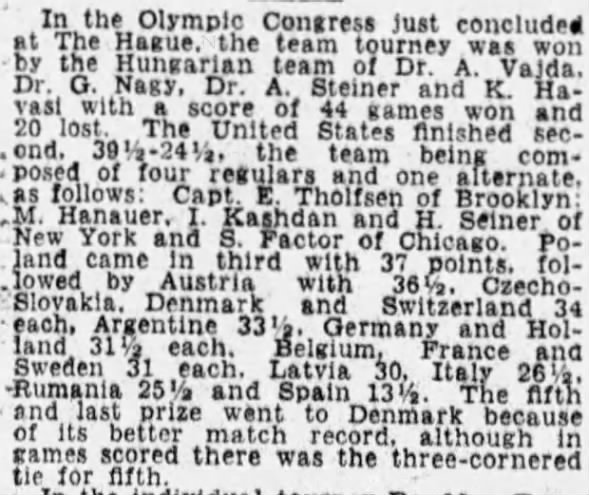 Olympic Congress at The Hague 19 Aug 1928, Sun The Los Angeles Times (Los Angeles, California) Newspapers.com
Olympic Congress at The Hague 19 Aug 1928, Sun The Los Angeles Times (Los Angeles, California) Newspapers.com
In the Olympic Congress just concluded at The Hague, the team tourney was won by the Hungarian team of Dr. A. Vajda, Dr. G. Nagy, Dr. A. Steiner and K. Havasi with a score of 44 games won and 20 lost. The United States finished second, 39½-24½, the team being composed of four regulars and one alternate, as follows: Capt. E. Tholfsen of Brooklyn; M. Hanauer, I. Kashdan and H. Steiner of New York and S. Factor of Chicago. Poland came in third with 37 points, followed by Austria with 36½, Czechoslovakia, Denmark and Switzerland 34 each, Argentine 33½, Germany and Holland, 31½ each. Belgium, France and Sweden 31 each. Latvia 30, Italy 26½, Rumania 25½ and Spain 13½. The fifth and last prize went to Denmark because of its better match record, although in games scored there was the three-cornered tie for fifth.
August 23 1928

 Honors for Kashdan 23 Aug 1928, Thu The Brooklyn Daily Eagle (Brooklyn, New York) Newspapers.com
Honors for Kashdan 23 Aug 1928, Thu The Brooklyn Daily Eagle (Brooklyn, New York) Newspapers.com
Honors for Kashdan.
In honor of the return of Isaac Kashdan from his victorious visit to The Hague, a rapid transit tournament was held at the rooms of the Manhattan Chess Club Saturday night in which Abraham Kupchik, club champion, was the first prize winner with the fine score of 9½-½. It was no surprise, inasmuch as Kupchik has a habit of doing this. At Lake Hopatcong in 1926, it will be recalled, he took first prize from Capablanca without losing a game. Last Saturday he allowed but one draw, which was to Lester Samuels, the third prize winner. Kashdan, with a score of 8½-1½, captured the second prize.
At The Hague, where, playing for the United States team, he won 12 games, drew two and lost only one, Kashdan headed the list of a total of 86 participants and received a special medal in recognition of his fine showing. Following is another of Kashdan's wins, gained at the expense of Dunkleblum of Belgium, together with a lively draw between M. Hanauer and Crepeaux of France.
Isaac Kashdan vs Arthur Dunkelblum
The Hague Olympiad (1928), The Hague NED, rd 9, Jul-29
Bishop's Opening: Vienna Hybrid (C28) 1-0
August 25 1928
 Olympic Chess Finals 25 Aug 1928, Sat The Winnipeg Tribune (Winnipeg, Manitoba, Canada) Newspapers.com
Olympic Chess Finals 25 Aug 1928, Sat The Winnipeg Tribune (Winnipeg, Manitoba, Canada) Newspapers.com
Olympic Chess Finals
As was foreseen over a week ago, Hungary came through as winner of the Olympic chess team tournament at The Hague with the United States a close second. The American team who performed thus brilliantly was captained by Erling Tholfsen, of Brooklyn, and was ably supported by Isaac Kashdan and Herman Steiner, of Manhattan, Milton Hanauer, of Brooklyn, and Samuel D. Factor, of Chicago.
August 28 1928
 American Finishes Second in Chess 28 Aug 1928, Tue Hartford Courant (Hartford, Connecticut) Newspapers.com
American Finishes Second in Chess 28 Aug 1928, Tue Hartford Courant (Hartford, Connecticut) Newspapers.com
American Finishes Second in Chess
Isaac Kashdan of the Manhattan Chess Club, New York, one of five members of the United States team which finished second in the International Chess Federation Tournament at The Hague, as part of the Olympic program, will play in the National Chess Federation tournament at Bradley Beach, N. J., September 5 to 19.
September 02 1928
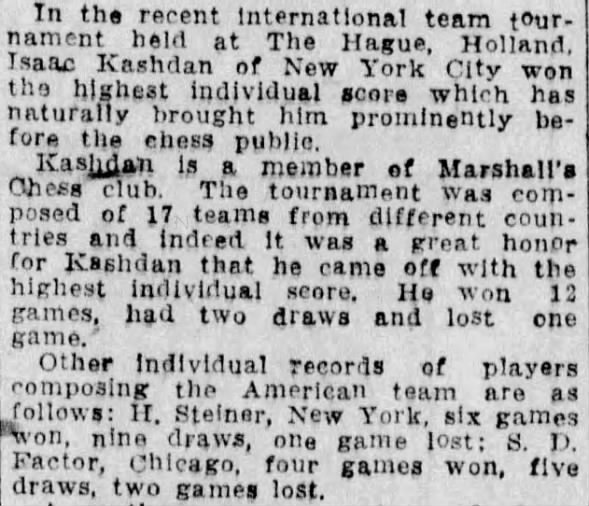 Highest Individual Score 02 Sep 1928, Sun The Commercial Appeal (Memphis, Tennessee) Newspapers.com
Highest Individual Score 02 Sep 1928, Sun The Commercial Appeal (Memphis, Tennessee) Newspapers.com
In the recent International team tournament held at The Hague, Holland, Isaac Kashdan of New York City won tho highest individual score which has naturally brought him prominently before the chess public.
Kashdan is a member of Marshall's Chess club The tournament was composed of 17 teams from different countries and indeed it was a great honor for Kashdan that he came off with the highest individual score. He won 12 games, had two draws and lost one game.
Other individual records of players composing the American team are as follows: H. Steiner, New York, six games won, nine draws, one game lost; S. D. Factor, Chicago, four games won, five draws, two games lost.
November 08 1928
November 08, 1928. An Invincible Quartet. The first appearancee in match play of Isaac Kashdan, American ace in the Olympic team tournament, since his return to this country, was in a team contest in Manhattan's financial district wherein four representatives of the Chase National Bank were pitted against a strong quartet from the firm of Holt, Rose & Troster, the head of which is president of the Manhattan Chess Club. It is doubtful if a more powerful team of young experts than that of the latter could be got together anywhere in this country. In addition to Kashdan, there were Morris A. Schapiro, A. S. Pinkus and R. Bornholz, all well known names. Consequently, it is a small wonder that the Chase National team was badly flattened out.
The following is the score of the game Kashdan won from his opponent.
Schermerhorn (white) vs. Isaac Kashdan (black)
Indian Defense: Anti-Nimzo-Indian
December 06 1928
 Tenner-Kashdan 06 Dec 1928, Thu The Brooklyn Daily Eagle (Brooklyn, New York) Newspapers.com
Tenner-Kashdan 06 Dec 1928, Thu The Brooklyn Daily Eagle (Brooklyn, New York) Newspapers.com
Next Tenner will be called upon to meet I. Kashdan, who made such an enviable record for himself and the United States team in the Olympic tournament at The Hague. Kashdan's opponent in the first round was Dr. Harry Kline, erstwhile University of Pennsylvania player. Kashdan was the winner. Lester Samuels, ex-Columbia University captain, defeated R. Wilman, and O. J. Belhoff drew with J. Fishman. The game between A. Kevitz and A. S. Kussman was postponed.
December 20 1928
 Kashdan vs. Tenner 20 Dec 1928, Thu The Brooklyn Daily Eagle (Brooklyn, New York) Newspapers.com
Kashdan vs. Tenner 20 Dec 1928, Thu The Brooklyn Daily Eagle (Brooklyn, New York) Newspapers.com
Kashdan vs. Tenner.
Following the lines of one of the four games contested between Capablanca and Dr. Vidmar in the New York tournament of 1927, 1. Kashdan brought about the downfall of Oscar Tenner—his first—in the championship tournament at the Manhattan Chess Club. Tenner, when he advanced his KN pawn at his 14th turn, created a “hole,” which was promptly occupied by a white knight. This gave Kashdan the upper hand and he made the most of it, winning the exchange.
However, he failed to make the best continuation on the 38th move and afforded Tenner a chance to fight back. The latter in turn erred at his 49th when, instead of capturing the adversary's center pawn, he placed his knight on a poor square. After that he lasted very little longer.
Isaac Kashdan vs Oscar Tenner
Manhattan CC-ch (1929), New York, NY USA
Spanish Game: Closed Variations. Chigorin Defense (C97) 1-0
December 27 1928
 Kevitz Takes the Lead. 27 Dec 1928, Thu The Brooklyn Daily Eagle (Brooklyn, New York) Newspapers.com
Kevitz Takes the Lead. 27 Dec 1928, Thu The Brooklyn Daily Eagle (Brooklyn, New York) Newspapers.com
Kevitz Takes the Lead
After four rounds of the annual tournament for the championship of the Manhattan Chess Club, A. Kevitz, one-time Brooklyn champion, has a clear lead over the field. Kevitz won all of his first four games. Lester Samuels, 3-l, comes next, followed by J. Fishman, 2½-½.
Appended are the scores of wins made by Kashdan and Beihoff.
Harry Kline vs Isaac Kashdan
Manhattan CC-ch (1929), New York, NY USA
Spanish Game: Morphy Defense. Tarrasch Variation (C77) 0-1
December 30 1928
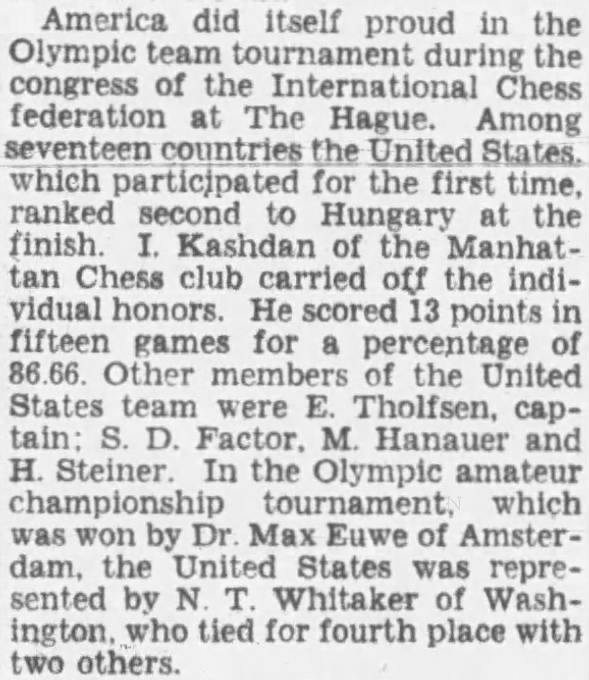 Olympic Chess Team Tournament 30 Dec 1928, Sun The Salt Lake Tribune (Salt Lake City, Utah) Newspapers.com
Olympic Chess Team Tournament 30 Dec 1928, Sun The Salt Lake Tribune (Salt Lake City, Utah) Newspapers.com
America did itself proud in the Olympic team tournament during the congress of the International Chess federation at The Hague. Among seventeen countries the United States, which participated for the first time, ranked second to Hungary at the finish. I. Kashdan of the Manhattan Chess club carried off the individual honors. He scored 13 points in fifteen games for a percentage of 86.66. Other members of the United 8tates team were E. Tholfsen, captain; S. D. Factor, M. Hanauer and H. Steiner. In the Olympic amateur championship tournament, which was won by Dr. Max Euwe of Amsterdam, the United States was represented by N T. Whitaker of Washington, who tied for fourth place with two others.











